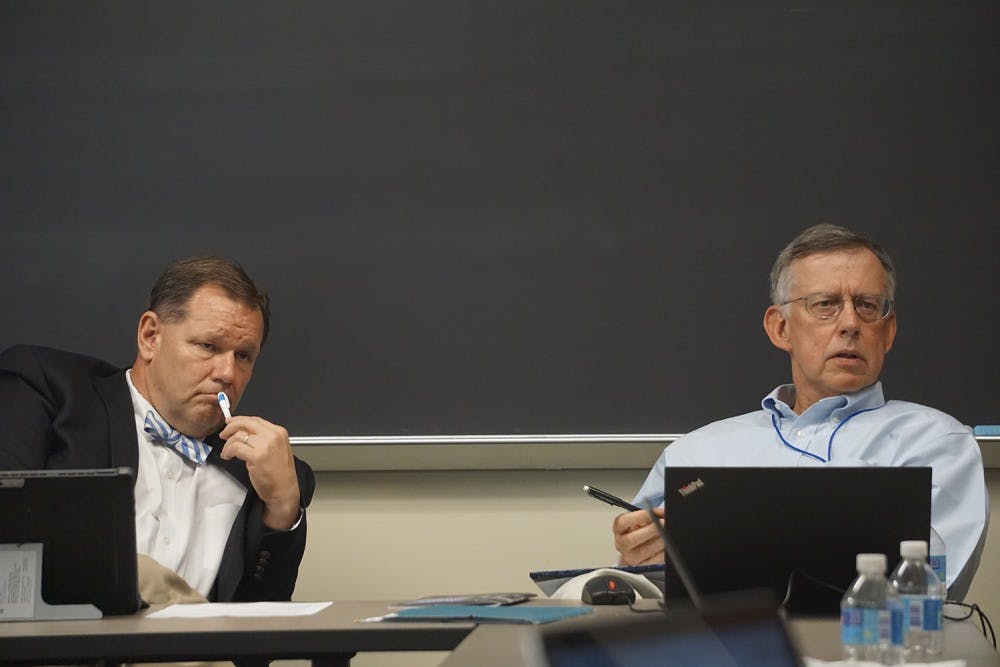The Advisory Committee is responsible for nominating a member of the voting faculty for the role. After faculty have been given a chance to put forth additional nominees, the Faculty Council votes for its preferred candidate.
“I think my Faculty Council colleagues are committed to diversity — I would like to think that this one's kind of fallen through the cracks,” Deb Aikat, a journalism professor on the FEC, said.
Asked whether the committee will make a concerted effort to elect a person of color or a woman to the role, Advisory Council Chairperson Suzanne Gulledge declined to comment before the Advisory Committee’s meeting on Nov. 11, where the process will be discussed.
In an email, Steponaitis said he doesn’t feel it’s appropriate to be interviewed at this time because the process hasn’t started, and he intends to recuse himself from the Advisory Committee’s deliberations.
But some professors feel the lack of diversity shouldn’t be ignored.
“If anybody has a heart and a conscience, they would think twice about the whole issue,” Aikat said.
American Studies professor Antonia Randolph said it’s less likely that the interests of marginalized groups will be represented when those in leadership roles are exclusively white men.
“To have a process that brings in more people who are not like the white men who have led before, you have to be more deliberate in bringing different sorts of people into that pool,” Randolph said. “I think it's hard to stop this. We're not especially trying to take on the lack of diversity and inclusion.”
Others felt the issue lies in the numbers.
Dr. Wendy Brewster, director of the Center for Women’s Health Research, said in an email that “the bench isn’t deep” when referring to the lack of diversity throughout the secretary position's history.
About 24 percent of tenured and tenure-track professors in 2019 come from marginalized backgrounds, according to an annual report from the Office of Institutional Research and Assessment. The report breaks down gender and ethnic backgrounds among full-time professors.
In terms of gender, about 49 percent of all full-time professors at UNC are female, according to the data, and 37 percent of tenured professors are female.
To get the day's news and headlines in your inbox each morning, sign up for our email newsletters.
The most current data will not be available until early December, according to UNC Media Relations.
“When you have diverse people, you have diverse voices,” Aikat said. “Your organization grows stronger. All faculty are supposed to be role models. If we are not role models for our students, the students get the wrong message.”
Randolph said research shows leaders from marginalized backgrounds are more likely to address the needs of other people of color or female constituents or representing bodies. But she noted that putting individuals from marginalized groups in these roles is not a guarantee that will happen.
On the other hand, Ferrell said diversity isn’t really needed in the secretary position.
“I don't think it would make any difference,” Ferrell said. “I'm looking at it from an internal point of view of the tasks the secretary performs. I don't really think that tasks that the secretary performs have much to do with ethnicity or gender.”
'You’re never going to advance in this office'
Anne Whisnant, who served as UNC's deputy secretary of the faculty until 2016, said the University needs to address complicated and vague language found within the 27-page faculty code handbook in order for change to begin taking place.
The faculty code, initially established in 1947, underwent several revisions over the years. It describes the rules of faculty governance and criteria professors need for leadership roles. Any secretary of the faculty nominee must be a member of the voting faculty, according to the code.
But Whisnant said interpreting complicated language within the handbook often falls on the hands of individuals who carry a wealth of experience and knowledge of the document.
“It privileges people who have already been inside of the system,” Whisnant said. “That keeps marginalized groups out of it because they aren’t insiders.”
And it became part of the reason why she decided to leave the deputy position. After being nominated for the secretary role alongside Steponaitis, Whisnant said she was told she couldn’t run for the post because she was not a member of the voting faculty at UNC. This was because her main job was a staff role, although she taught courses part-time.
In a written counterargument, Whisnant said her position was not less than 75 percent of an equivalent full-time position — one of the requirements needed to be eligible as a nominee.
“I wish you’d just withdraw,” Ferrell told Whisnant in a later in-person conversation.
Ferrell confirmed the exchange, but added that he consistently gave Whisnant high ratings and recommendations on her annual performance evaluations.
After the position was given to Steponaitis, Whisnant said some of her colleagues began to call her “crazy” and said she “shouldn't make a big deal of it” when she wasn’t elected to the position.
“The message was being sent that I needed to stop talking about the problems within the office,” Whisnant said.
Following the secretary election, Whisnant took on a full-time teaching position at East Carolina University. About a year later she moved to Duke University to teach and serve as its director of Graduate Liberal Studies, where she currently is now. Whisnant, however, is still an adjunct professor at UNC.
“It reached what you might call a glass ceiling or some kind of brick wall,” Whisnant said. “Basically, you’re never going to advance in this office.”
@heidi_perez02
university@dailytarheel.com




